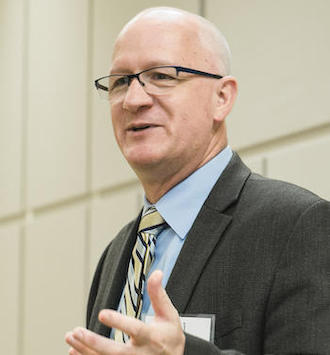Meta-Analysis - Online Course
A 3-Day Livestream Seminar Taught by
David WilsonThursday, May 2 –
Saturday, May 4, 2024
10:00am-12:30pm (convert to your local time)
1:30pm-3:30pm
How do you make sense of conflicting results across studies? It is common for a finding that is statistically significant in one study to be statistically nonsignificant in another. Does this reflect differences in the design of the studies? Do the effects actually agree in direction and magnitude even if they are different in statistical significance? What if we have 5 such studies, or 50, or 500? It would be surprising if all such studies were in perfect agreement with one another. Thus, we need a method to make sense of the variability in findings across studies.
Meta-analysis is a statistical solution to this problem and has become a widely-used method for synthesizing results across studies in the social, biomedical and physical sciences. The key to meta-analysis is the effect size: it encodes the direction and magnitude of the finding on a common scale. Using specialized statistical methods, the average effect across studies can be estimated as well as an examination of the consistency of the effects. Analyses can also explore potential explanations for inconsistencies in findings, such as theoretically relevant design differences.
This course will provide hands-on instruction in conducting all aspects of a meta-analysis. You’ll learn to systematically search for studies to include in a meta-analysis, to code and extract data systematically, to compute effect sizes of various types, and to estimate both fixed and random-effects meta-analysis models. Finally, you will learn how to report and present the results of a meta-analysis.
Starting May 2, we are offering this seminar as a 3-day synchronous*, livestream workshop held via the free video-conferencing software Zoom. Each day will consist of two lecture sessions which include hands-on exercises, separated by a 1-hour break. You are encouraged to join the lecture live but will have the opportunity to view the recorded session later in the day if you are unable to attend at the scheduled time.
*We understand that finding time to participate in livestream courses can be difficult. If you prefer, you may take all or part of the course asynchronously. The video recordings will be made available within 24 hours of each session and will be accessible for four weeks after the seminar, meaning that you will get all of the class content and discussions even if you cannot participate synchronously.
Closed captioning is available for all live and recorded sessions. Live captions can be translated to a variety of languages including Spanish, Korean, and Italian. For more information, click here.
If you are interested in this topic, check out our “Methods for Meta-Analysis: 40 Years of Progress” livestream seminar taught by Larry Hedges on March 27.
Computing
This seminar will use Stata and SPSS for the worked exercises. Stata version 16+ will work for the course examples and exercises. SPSS users should have access to version 28. Basic familiarity with Stata, SPSS, or R is highly desirable, but even novice coders should be able to follow the presentation and do the exercises.
R exercises are available upon request.
If you’d like to take this course but are concerned that you don’t know enough Stata, we recommend following along with a “getting started” video like the one here before the seminar begins.
Seminar participants who are not yet ready to purchase Stata could take advantage of StataCorp’s free 30-day evaluation offer or their 30-day software return policy.
This seminar will use Stata and SPSS for the worked exercises. Stata version 16+ will work for the course examples and exercises. SPSS users should have access to version 28. Basic familiarity with Stata, SPSS, or R is highly desirable, but even novice coders should be able to follow the presentation and do the exercises.
R exercises are available upon request.
If you’d like to take this course but are concerned that you don’t know enough Stata, we recommend following along with a “getting started” video like the one here before the seminar begins.
Seminar participants who are not yet ready to purchase Stata could take advantage of StataCorp’s free 30-day evaluation offer or their 30-day software return policy.
Who should register?
This course will be helpful for researchers in any field who want to learn how to statistically synthesize results across independent studies using meta-analytic methods. Participants should have a basic working knowledge of introductory statistics through multiple regression analysis. No knowledge of matrix algebra is required or assumed but familiarity with standard statistical notation is useful.
This course will be helpful for researchers in any field who want to learn how to statistically synthesize results across independent studies using meta-analytic methods. Participants should have a basic working knowledge of introductory statistics through multiple regression analysis. No knowledge of matrix algebra is required or assumed but familiarity with standard statistical notation is useful.
Seminar outline
Day 1
1. Logic of meta-analysis
2. Scope and problem formulation
3. Computing effect sizes
4. Coding studies and database structure
Day 2
5. Fixed-effect meta-analysis
6. Random-effects meta-analysis
7. Categorical moderator analysis
8. Regression-based moderator analysis
Day 3
9. Creating forest plots
10. Robust standard errors for dependent effect sizes
11. Assessing publication bias
12. Interpretation and reporting of results
Day 1
1. Logic of meta-analysis
2. Scope and problem formulation
3. Computing effect sizes
4. Coding studies and database structure
Day 2
5. Fixed-effect meta-analysis
6. Random-effects meta-analysis
7. Categorical moderator analysis
8. Regression-based moderator analysis
Day 3
9. Creating forest plots
10. Robust standard errors for dependent effect sizes
11. Assessing publication bias
12. Interpretation and reporting of results
Payment information
The fee of $995 includes all course materials.
PayPal and all major credit cards are accepted.
Our Tax ID number is 26-4576270.
The fee of $995 includes all course materials.
PayPal and all major credit cards are accepted.
Our Tax ID number is 26-4576270.

